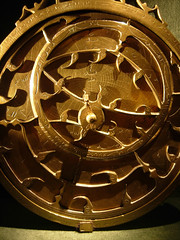Note: You may recall that Scott G.F. Bailey has participated in several of ISLF's shared storytelling events, but fear not, ye who suss out conflicts of interest! In order to maintain objectivity, I never accept review copies, and The Astrologer was purchased with my own funds.
Expectations are odd things: Sometimes you don't even know you have them until after they've been breached. From reading Scott G.F. Bailey's blog, I knew he adored literary greats such as Chekhov, Joyce, and Shakespeare, and I expected his debut novel, a period drama dubbed The Astrologer, would bear all the qualities concomitant with that love. On the positive side, I thought the book would contain beautiful turns of phrase, intriguingly rounded characters, and a well-researched milieu. But literary works also have a reputation for stodgy plotting, descriptive overindulgence, and impenetrable themes. I must've some consciously expected some of these flaws to turn up in The Astrologer, because it surprised me when I reached the final page and realized not a single one had appeared.
It is the end of the first year of the 17th century, and Danish royal astrologer Soren Andersmann has a single goal -- to kill the king. This occupational shift from star scryer to amateur assassin came about not because of some personal slight from old King Christian son of Rorick. Soren still draws up the King's horoscope (although some he sometimes doctors the results to avoid official displeasure), still has the ear of the prince (although young Christian now lusts more for battle than lessons on the astrological sciences), and still has time to write a philosophical treatise (although some mutter that his musings are treasonous). No, Soren wants to murder the king due to the death of his one-time tutor, Tycho Brahe. A brilliant astrologer and theorist, Brahe got on the wrong side of royal wrath and fled to Prague where he met his end at the hands of a hired killer. Denmark might've cast aside its backward ways if Brahe had but lived, and Soren intends for the brutish, self-satisfied king to fully pay for that sin.
The Astrologer isn't about the ethics of killing. It isn't about the inexorable advance of science. It isn't about the misguided religious beliefs of those who advocate for the divine right of kings. Instead, The Astrologer is about disillusionment, the slow stripping away of everything upon which you once relied. You find hints of this theme by the second chapter when a false horoscope presented to the king proves prophetic. "It is at such moments that one has a fleeting urge to give over all belief in astrology," Soren muses, but ultimately concludes that "I must have cast my secret horoscope poorly, not seeing what the stars truly showed." He will have other beliefs to give up by book's end, beliefs about family and friends, about his beloved mentor and the slyly duplicitous nature of the heart. Bailey couches all of this in fine yet spare prose that's liberally sprinkled with allusions. A little prior time with Hamlet wouldn't hurt; neither would multiple re-readings due to the cunning foreshadowing. Fortunately, Bailey also seems to know that novels ought first to entertain, and The Astrologer does so with grisly sword fights aplenty and a finale that's literally explosive. One needs no arcane chart to foretell that Bailey has quite a compositional future ahead.
(Picture: CC 2008 by Diorama Sky)
Friday, April 12, 2013
Subscribe to:
Post Comments (Atom)



3 comments:
This is a delightful surprise, thanks! I can't argue with a word of this. Also, your daughter is right; the book is a hat.
Sounds a bit like Neil Stephenson's Baroque trilogy, only perhaps with fewer fascinating philosophical discussions, no mad Isaac Newton, and more action. Wishlist'd.
(Btw, Neil Stephenson is rather difficult to describe, but very worth putting on your list. Few authors can pull off a climactic action scene in which spacemen use a combination of Platonic philosophy and quantum physics to survive, win a battle, and rescue the damsel in distress. But he's just that good at explaining complicated ideas, and then using them in surprising ways.)
Scott: De nada, sir. I quite enjoyed it.
CR: I've read a little bit of Stephenson (Snow Crash), but haven't ventured on to his later stuff. It just looks so intimatingly long!
Post a Comment